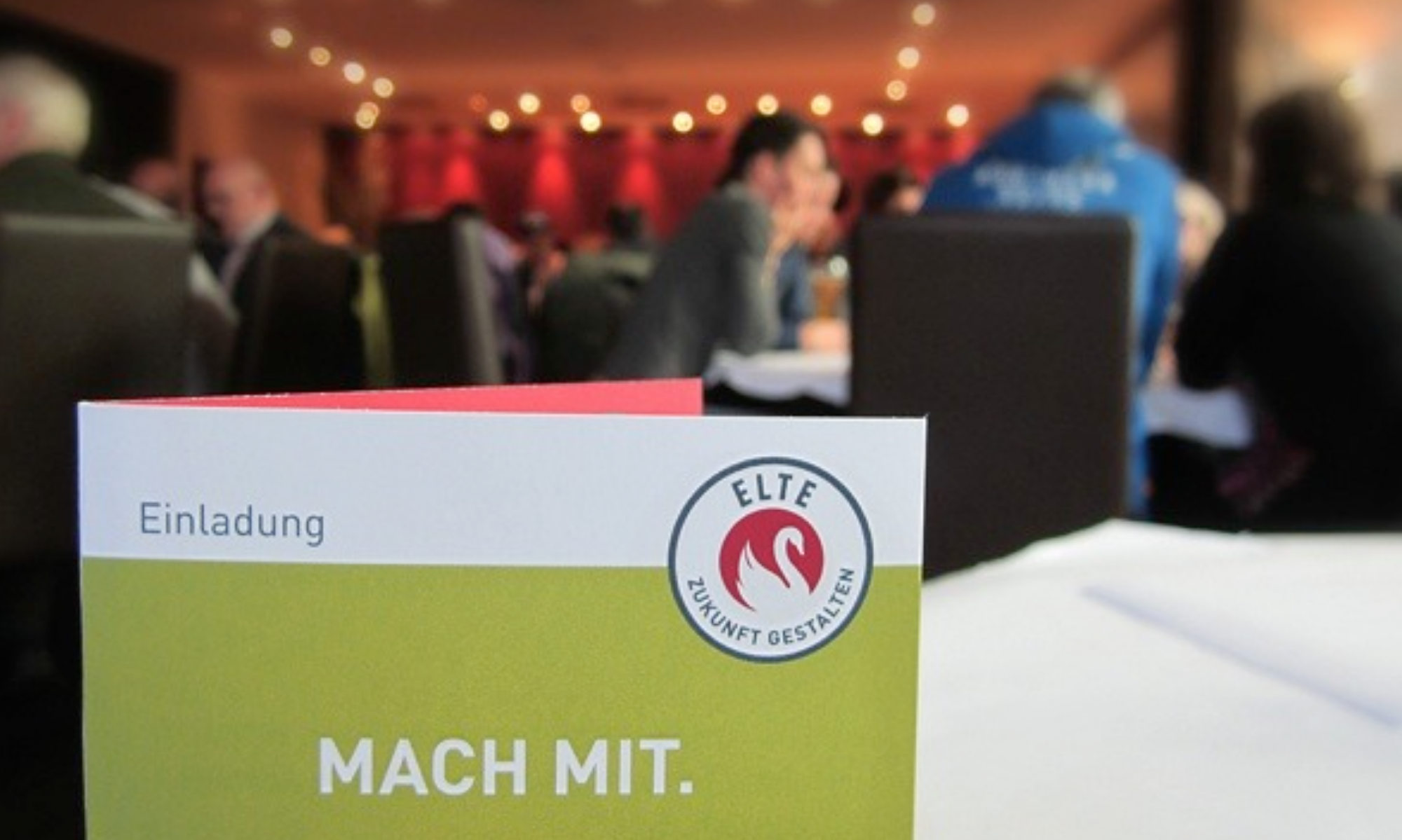Engaging Businesses in the Circular Economy and Strengthening System Redesigns
In my latest podcast episode, I sit down with Edward „Ned“ Clarence-Smith, a Circular Economy Expert with extensive private sector and international experience. He shares his insights on resource efficiency and sustainable business strategies. Tune in for a deep dive into the future of circular practices!
You can read the summarised essentials of the conversation below or listen to the podcast directly here or under this link.
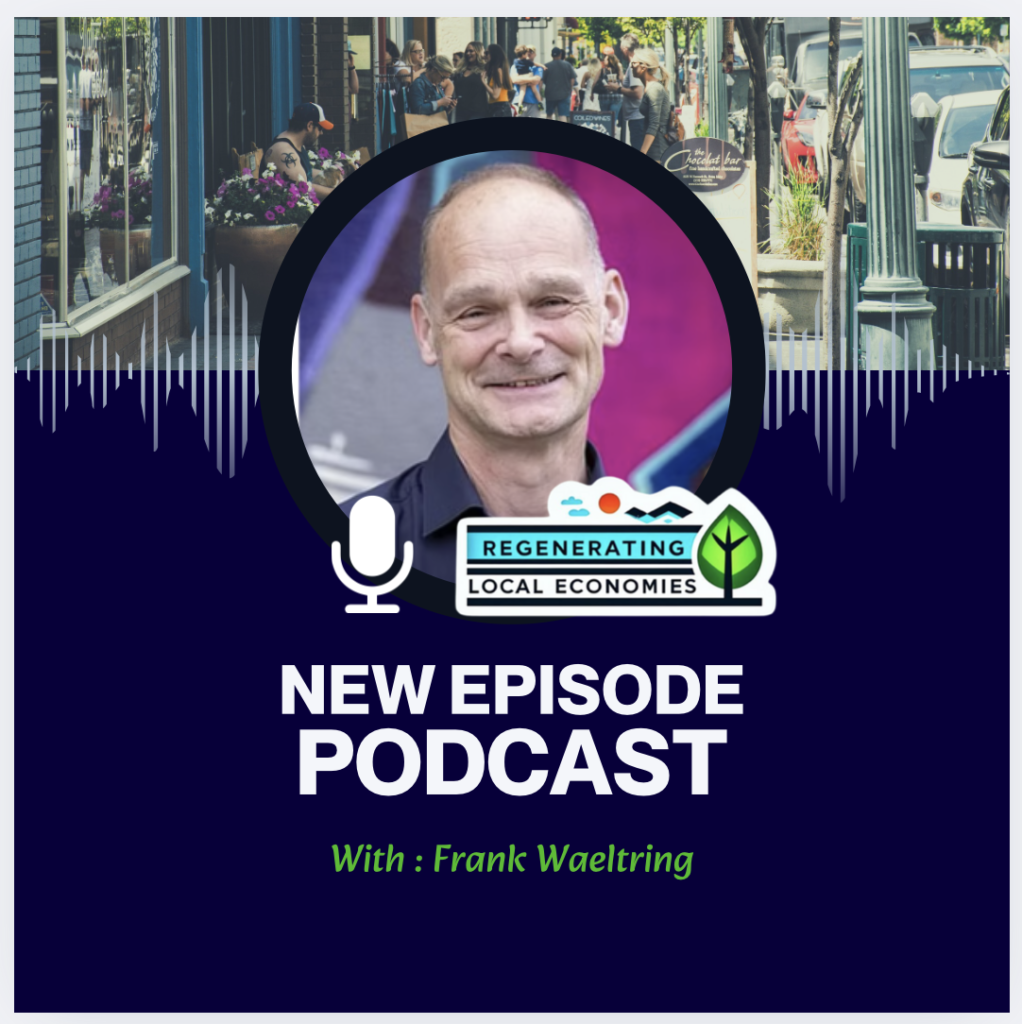
„In the early days, the primary focus was on minimizing industrial emissions and waste—essentially plugging the leaks in the system. The goal was to reduce damage rather than rethink the system itself. However, by the mid-1980s, people, particularly in industry, began questioning why so much time and money were being spent on damage control. Instead, the conversation shifted toward preventing waste and emissions at the source.“ (Ned Smith)
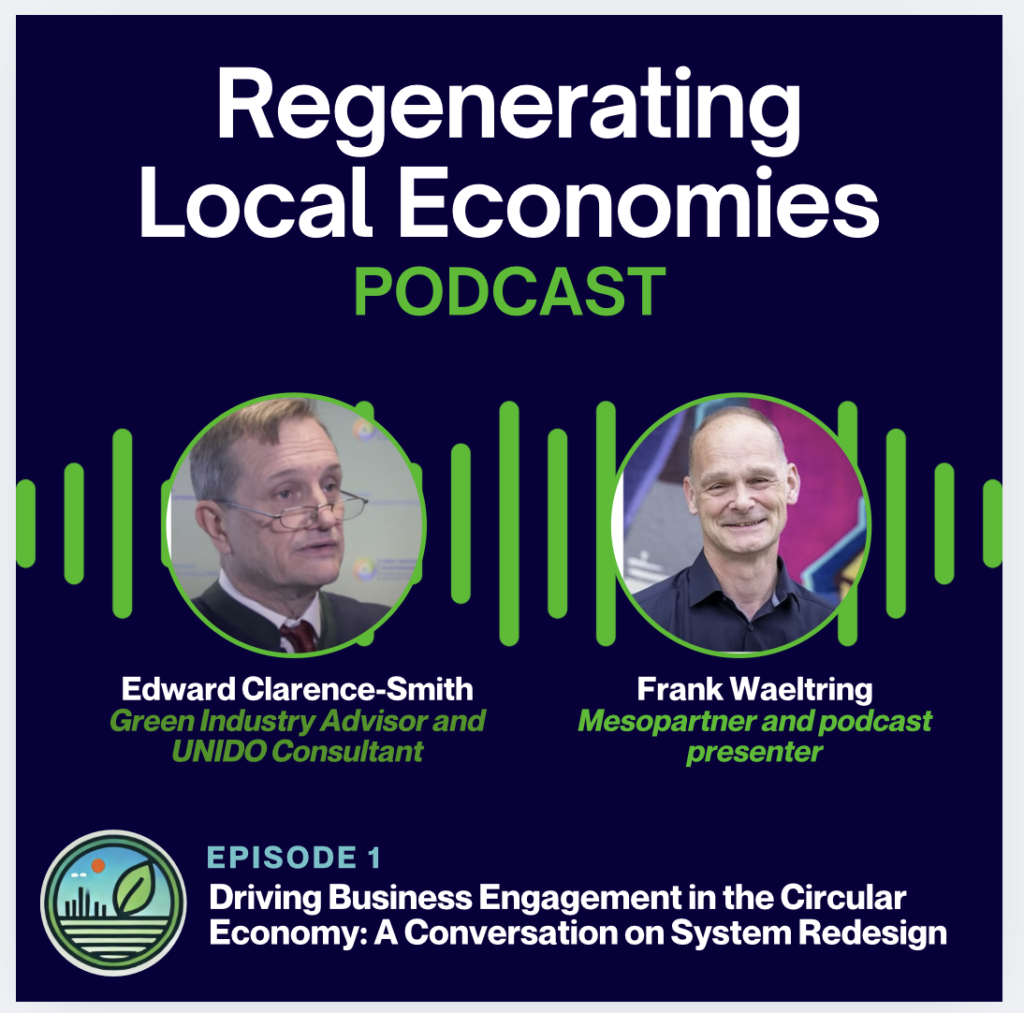
In this conversation, Frank Waeltring from Mesopartner has an engaging exchange with Ned Smith, who brings over 40 years of industry consulting experience. Ned’s career began with cost-benefit analysis, evolved toward resource efficiency, and most recently, focused on redesigning production systems— a key aspect of the circular economy.
During the discussion, we explored how to promote the redesign of production systems, particularly in developing countries, how to support businesses looking to enhance their innovation capabilities, and how to foster circular production solutions by starting with forward-thinking businesses and building a supportive ecosystem around them.
Frank:
It’s a pleasure to speak with you today, Ned. Your full name is Edward Clarence Smith, and our topic of discussion is the circular economy—an area of great interest to both of us. We’ve worked together on projects related to this in Egypt, as well as with the Swiss Development Corporation.
You have extensive experience, not just within the European Union, but also in developing countries. When you hear the term „circular economy,“ what image or metaphor comes to mind?
Ned:
I think the first image that comes to most people’s minds is something circular—something that continuously circles. Many people initially associate the circular economy with the idea of materials, products, and resources moving in loops. In fact, for a lot of people, the first thought that comes to mind is recycling. They see the circular economy as a more advanced form of recycling.
Frank:
Do you see it differently?
Ned:
Yes, I came to this field from a slightly different perspective. I started working in environmental issues 40 years ago, with a background in chemical engineering, which naturally led me to focus on industry. My work has often been at the intersection of industry and the environment, looking at economic and cost-benefit aspects.
In the early days, the primary focus was on minimizing industrial emissions and waste—essentially plugging the leaks in the system. The goal was to reduce damage rather than rethink the system itself. However, by the mid-1980s, people, particularly in industry, began questioning why so much time and money were being spent on damage control. Instead, the conversation shifted toward preventing waste and emissions at the source.
I first encountered this approach in the U.S., where the term “pollution prevention” was widely used. Later, working with UNIDO (United Nations Industrial Development Organization), we helped companies in developing countries identify ways to reduce waste and emissions at their source.
But over time, I realized that the problem was deeper. Developed economies, in particular, were consuming far too many resources. The idea that we could simply become more efficient and solve the problem wasn’t enough. Efficiency is important, but it’s only part of the solution. The missing piece, in my view, was the circular economy.
Frank:
Can you summarize what the circular economy means in a nutshell? What are the key elements that distinguish it from cleaner production?
Ned:
At its core, the circular economy is about decoupling economic growth from resource extraction. The problem today is that economic growth and raw material extraction are closely linked.
To address this, the circular economy is built on three main principles:
- Efficiency – Improving efficiency in both production and resource use to reduce waste.
- Slowing Material Flows – Extending the lifespan of products and keeping them in use for as long as possible.
- Recycling and Reuse – Prioritizing the reuse of materials already in circulation over the extraction of new raw materials.
So, in summary, it’s about decoupling growth from extraction, improving efficiency, slowing down material use, and prioritizing reuse and recycling.
Frank:
And while we talk about circularity, we must also emphasize economic development. At Mesopartner, we address this through promoting green economic development. The challenge is to promote economic growth while ensuring sustainability. When we look at remanufacturing, material reuse, and product redesign, we find not only new business opportunities but also innovation opportunities. This requires collaboration with research institutions and experimentation.
Ned:
Absolutely. Innovation is at the heart of the circular economy. Take product design, for example—if products aren’t designed for reuse, repair, or recycling, it becomes much harder and costlier to implement circular solutions. Poor design creates barriers to sustainability.
But innovation isn’t just about redesigning products. We also need to redesign entire systems. A crucial shift is moving toward a more service-based economy, where businesses provide the functionality of products rather than just selling them outright. This requires a complete rethink of business models and distribution systems to make circularity economically viable.
Consumers also play a role. They need to adopt new ways of using and thinking about products. So innovation isn’t just about technology or business models—it’s also about changing consumer behavior.
Frank:
I like how you describe it as a system redesign. But there’s also a normative aspect to this—if we fail to transition to a circular economy, the economic and environmental consequences will be severe.
We work in both developed and developing countries. Historically, industrialized nations have caused the most environmental damage over the last two centuries. How can we promote circular economy principles globally without imposing a politically conditioned or normative approach on countries that have not yet fully industrialized?
Ned:
That’s an important point. The key to the circular economy is proving that economic development can continue while reducing material consumption. We’re not talking about stopping growth—we’re talking about shifting to a different model of development.
For countries that are still industrializing, the challenge is to leapfrog over the wasteful, resource-intensive development path that many Western economies followed. Instead of repeating the mistakes of the past, they can adopt a more sustainable model from the start.
Frank:
That brings us back to system redesign, which requires responsibility from all stakeholders—businesses, consumers, policymakers, and support organizations. At Mesopartner, we apply systemic frameworks, addressing businesses, consumers, and service providers, while also considering political and regulatory conditions.
In developing countries, can we start circular economy initiatives at the business level, even without strong policy frameworks? Or do we need government policies in place first?
Ned:
In an ideal world, governments would take the lead in designing the transition to a circular economy. But in reality, especially in many developing countries, starting at the business level is often more effective.
Businesses have a practical understanding of material flows, supply chains, and efficiencies. They can adopt circular strategies more quickly and demonstrate success, which can then influence policy.
Moreover, globalization plays a role. Many products consumed in developed countries are manufactured in developing countries. As circular economy policies gain traction in industrialized nations, pressure will naturally filter down supply chains, encouraging businesses in developing countries to adapt.
In short, while policy frameworks are important, businesses can and should take the lead in driving circular economy practices, even in countries where formal policies are not yet in place.
Frank:
We see this buyer pressure clearly in a research we did about suppliers exporting into the EU. The European Green Deal and the related directives have also impacted large corporations and buyers of supplying products. For example suppliers from Bosnia and Herzegovina in the wood processing and metal sector exporting to Germany and Italy experience supply chain pressure from their buyers on green and digital requirements.
From your perspective, what would be two or three enry points to promote circular economy efforts at the business level, potentially involving service providers and supporting organizations?
Ned:
We are still at a stage where, especially in developing countries, stakeholders across the economy—not just businesses—lack a real understanding or awareness of what we are discussing. The first crucial step is awareness raising and training. This should be tailored to address the specific needs and expectations of businesses while ensuring a broader understanding of circular economy principles.
Second, we should work with companies that show genuine interest in exploring circular economy opportunities within their operations. This involves helping them assess viable strategies, identifying options, and determining how these practices can be integrated into their products and processes.
If these efforts prove fruitful and a company sees real business potential, the next challenge is overcoming resistance to change. Like all of us, businesses tend to stay within their comfort zones. Taking risks—especially when venturing into new economic models—can be daunting. That’s why we must identify industry leaders willing to embrace change and support them in navigating this transition.
Once these pioneers take the lead, we can leverage support from service institutions to facilitate necessary product redesigns, business model adjustments, and even policy advocacy. This is where we can engage the political system, as companies often encounter institutional and regulatory barriers that hinder circular economy initiatives. By fostering dialogue between businesses and policymakers, we can work toward necessary policy adaptations.
Lastly, once the government is engaged, we can shift our focus to consumer behavior. While consumers play a crucial role, their influence is more passive compared to businesses and policymakers. Their impact is shaped by purchasing decisions and product usage. Here, governments can implement policies that educate and guide consumers toward sustainable choices, ensuring they have access to better alternatives.
Frank:
I agree that in cases where government support is weak, it can be beneficial to strengthen private sector cooperation by fostering closer relationships between buyers and suppliers. In less hierarchical, trust-based business ecosystems, suppliers and buyers can mutually support each other in adopting circular economy practices—rather than being driven solely by market forces. We see this happening in many supply chain relations.
I also appreciate how you consider different levels—business, supporting organizations, and policy. It is not a good strategy to simply wait for the middle class to shift its consumer behavior. Instead, there needs to be a market-driven incentive to truly change mindsets and production methods within businesses.
What advantages could encourage businesses to adopt a circular perspective?
Ned:
Some companies have already transitioned toward circularity for their products, and interestingly, this shift has often been market-driven rather than policy-driven. A great example comes from the office equipment industry, particularly photocopiers and similar complex, high-value products.
Many companies in this sector have moved from selling products to leasing them, which is a crucial step toward a service-based model. Through leasing, they also provide maintenance and repair services, extending the product’s lifespan and improving efficiency. At the end of its use, the company takes the product back and decides whether to:
- Resell it in the secondhand market.
- Disassemble and remanufacture it using reusable components.
- Recycle the remaining materials.
A similar approach can be seen in car-sharing models, where manufacturers realized that by selling cars, they lost out on the value of shared mobility. Instead, some companies have shifted towards offering mobility as a service, either by launching their own platforms or acquiring tech startups in the sector.
Frank:
That makes sense—many businesses are realizing that owning the product throughout its lifecycle creates more value than simply selling it. We see this trend in the startup scene, where major car manufacturers are acquiring or collaborating with mobility platforms.
Beyond sharing models, another key area is resource efficiency. Some industries, particularly resource-intensive ones, are facing rising costs and supply chain risks. Do you have any examples of companies addressing this?
Ned:
Yes, one example—again from the office equipment industry—involves a company that recognized the risks associated with sourcing raw materials. Some of their key materials come from geopolitically unstable regions or are projected to become scarce in the near future, driving up prices.
To mitigate these risks, the company started „mining“ its own products—recovering materials from used equipment rather than relying solely on virgin resources. This not only reduces their exposure to supply chain shocks but also lowers costs.
Another strong example is Caterpillar, which has been active in remanufacturing for years. The company takes back heavy machinery, refurbishes key components like engines and hydraulics, and reintegrates them into new products. Remanufacturing is significantly cheaper than producing from scratch, as it preserves much of the value from the original manufacturing process.
Some companies worry that remanufacturing could cannibalize their new product sales, but Caterpillar sees it differently. They target two distinct market segments—one for brand-new equipment and another for cost-conscious buyers who prefer remanufactured products. This strategy allows them to expand their customer base while integrating circular economy principles into their business model.
Frank:
That’s a great example of how circularity can be a competitive advantage. Looking ahead, where do you see the biggest opportunities in the next 10 years?
Ned:
A promising area is packaging, especially plastic packaging. When we visit a supermarket, almost everything—from apples to grapes—is wrapped in plastic. Finding sustainable alternatives presents a massive innovation and business opportunity.
Reducing single-use plastic is relevant not just for developing countries, where cost reduction is a priority, but globally, as sustainability regulations and consumer awareness increase.
Personally, I see a major opportunity in education. The transition to a circular economy will ultimately belong to the next generation. My goal is to teach and inspire young people, especially those outside of traditional scientific fields—economists, policymakers, and business leaders—who may not yet be familiar with these concepts.
I’ve seen how exciting it is when students and professionals realize the potential of circular economy solutions. It’s that “lightbulb moment” when they see how these ideas can be applied in real-world business models.
Beyond education, product design will be another critical area. I know designers who are now focusing on circular and sustainable product innovation. This is especially important in developing countries, where local designers must create solutions tailored to their specific economic and cultural contexts rather than relying on external designs.
Frank:
That’s a crucial point. We often talk about creating knowledge networks in different regions, ensuring that circular innovations are adapted to local needs and realities. This extends beyond product design into remanufacturing, resource efficiency, and materials science.
Another important aspect is the social and economic transformation required for circular economies to thrive. We need to engage social scientists and economists to explore how this shift affects human behavior, cultural norms, and economic models.
Ned:
Absolutely. Circular economy is not just about technical solutions—it’s also a behavioral and systemic change. People need to understand how this transition benefits them and how they can be part of the solution.
One of the most exciting aspects of this work is helping businesses realize the opportunities. Many practitioners in cleaner production have described the “aha” moment when companies recognize how sustainable practices can improve efficiency and profitability. I believe the circular economy will have a similar effect on a much larger scale.
While some advocate for degrowth as the only way forward, that approach often feels pessimistic. The circular economy presents an alternative path, allowing businesses and societies to thrive while reducing material consumption.
Frank:
I completely agree. The circular economy taps into human creativity and provides practical, scalable solutions rather than just constraints.
Thank you, Ned—this was a fantastic discussion, full of valuable insights. I look forward to continuing this conversation soon!
Ned:
Likewise! Looking forward to our next discussion. Greetings from Vienna!
_____________________________
Interested in training or consultancy support? Ned provides consultancy and several professional trainings on a variety of topics, including circular economy and other green economic development topics. If you are interested in learning about program offers, contact him through LinkedIn or directly via mail (eppclarencesmith@gmail.com).
Promoting Circular Territorial Development
„Sustainable Future Cities, Towns and Communities“ (V)
“Circularity is not a trend; it’s a culture shift” (Ken Webster, 2017)
Looking at the inefficient and polluting way that energy is produced and used worldwide, it becomes apparent that we are still following the linear economic development model of “take, make, use, lose” (Raworth, 2017). In the local context, the social and environmental impacts of the linear economic model are particularly evident, namely the effects of climate change, ecological degradation and social exclusion.

Tools to strengthen donut approaches in cities and through workshop formats
„Sustainable Future Cities, Towns and Communities“ (IV)
We introduced the essential aspects of Kate Raworth’s Doughnut in our last blog. But how can we put this approach into practice? How can we successfully transform regions and other locations into doughnut economies? How do we motivate people, organisations and political actors in cities and communities to embark on new search processes and develop new perspectives? How can practice be fertilised with new concrete measures that also allow new experiments?
The doughnut approach has already been used as a strategy tool in many cities. This is where the Doughnut Economics Action Lab (DEAL) and the Thriving Cities Initiative (TCI), launched in 2020, have made a major contribution. The TCI is a collaboration between C40 Cities, the Doughnut Economics Action Lab and the Circle Economy, which strive to create more equitable, sustainable and resilient places for people to live. The network was founded by Raworth and practitioners as an exchange platform to jointly develop tools for the initiation and launching of concrete implementation experiences at local level.
Presentation of two tools for deeper reflection
„Tools to strengthen donut approaches in cities and through workshop formats“ weiterlesenDer Donut: Instrumente für die Praxis und für Sensibilisierungsworkshops
„Nachhaltige Zukunftsstädte und Gemeinden“ (IV)
Wir stellten im letzten Blog die wesentlichen Aspekte des Donuts von Kate Raworth vor. Aber wie können wir die Perspektive dieses Ansatzes in die Praxis einbringen? Wie können wir Regionen und andere Standorte erfolgreich in Richtung einer Donut-Wirtschaft umgestalten? Wie motivieren wir Menschen, Organisationen und politische Akteure in Städten und Gemeinden, sich auf neue Suchprozesse zu begeben und neue Perspektiven zu entwickeln? Wie kann die Praxis mit neuen konkreten Maßnahmen befruchtet werden, die auch neue Experimente zulässt?
Der Donut wurde bereits in vielen Städten als Strategieinstrument genutzt. Hier hat das Doughnut Economics Action Lab (DEAL), und die ins Leben gerufene Thriving Cities Initiative (TCI) einen wichtigen Beitrag geleistet. Die TCI ist eine Zusammenarbeit zwischen C40 Cities, Doughnut Economics Action Lab und Circle Economy mit dem Ziel, gerechtere und nachhaltigere Lebensräume für Menschen lokal und global zu schaffen. Das Netzwerk wurde von Raworth und Praktikern als Austauschplattform gegründet, um gemeinsam Instrumente für die Initiierung und Einführung konkreter Umsetzungserfahrungen auf lokaler Ebene zu entwickeln.
Zwei Instrumente für neue Fragestellungen und Lösungsansätze
„Der Donut: Instrumente für die Praxis und für Sensibilisierungsworkshops“ weiterlesen„We need experimental laboratories for sustainable transformation in the locations and regions.“
Discussion between Birgit Neyer and Frank Wältring on the future of local economic development
Available also as German Videocast and Podcast
„How do we initiate a sustainable transformation process in rural areas and also rethink economic development at the local level to promote this way of development?“ is the crucial topic of the discussion between Birgit Neyer and Frank Wältring. Birgit Neyer is Managing Director of WESt mbH, the economic development agency of the district of Steinfurt, a region in Germany. Frank Wältring is business partner of the consulting firm Mesopartner and was born in the district of Steinfurt. He works internationally in the field of local and regional economic and innovation promotion. Both believe that the topic of sustainable transformation needs to be more firmly anchored in rural areas and in economic development promotion activities.
Frank Wältring (FW): We know that change starts in the cities and villages. How can we manage to integrate the topic of „sustainable innovation promotion within cities and regions“ into traditional methods of economic development promotion?
„„We need experimental laboratories for sustainable transformation in the locations and regions.““ weiterlesen„Wir brauchen experimentelle Reallabore zur nachhaltigen Transformation in den Städten und Kreisen!“
Videocast, Podcast und Textzusammenfassung vom Gespräch zwischen Birgit Neyer und Frank Wältring zur Zukunft der lokalen Wirtschaftsförderung
„Wie schaffen wir es, im ländlichen Raum eine nachhaltige Transformation anzustoßen und auch die Wirtschaftsförderung neu zu denken?“, ist die wesentliche Frage des Gesprächs zwischen Birgit Neyer und Frank Wältring. Birgit Neyer ist Geschäftsführerin der WESt mbH, der Wirtschaftsförderung des Kreises Steinfurt. Frank Wältring ist Partner der Beratungsfirma Mesopartner. Beide glauben, dass das Thema der nachhaltigen Transformation im ländlichen Raum und in der Wirtschaftsförderung stärker verankert werden muss.
Das Gespräch lässt sich als Videocast, Podcast und im folgenden als zusammengefasste schriftliche Quintessenz finden.
Frank Wältring (FW): Wir wissen, der Wandel beginnt in den Städten und Dörfern. Wie bekommen wir das Thema „nachhaltige Innovationsförderung“ in die traditionelle Wirtschaftsförderung hinein?
„„Wir brauchen experimentelle Reallabore zur nachhaltigen Transformation in den Städten und Kreisen!““ weiterlesenThe Doughnut approach – key aspects and questions to raise for the promotion of local economic development
Sustainable Future Cities, Towns and Communities (III)
“Cities have a unique role and opportunity to shape humanity´s chances of thriving in balance with the rest of the living planet this century.” (Doughnut Economics Action Lab)
The thinking behind the above quote by the Doughnut Economics Action Lab is challenging our understanding of local economic development in many ways. What makes a local and national economy healthy, thriving, respectful towards other communities worldwide, regenerative and redistributive? What kind of understanding of local economic development and action is needed to promote local living conditions within our planetary boundaries for the majority of citizens? How does one make the best use of the available material and knowledge resources for a decent development path?
Figure 1: The Doughnut model
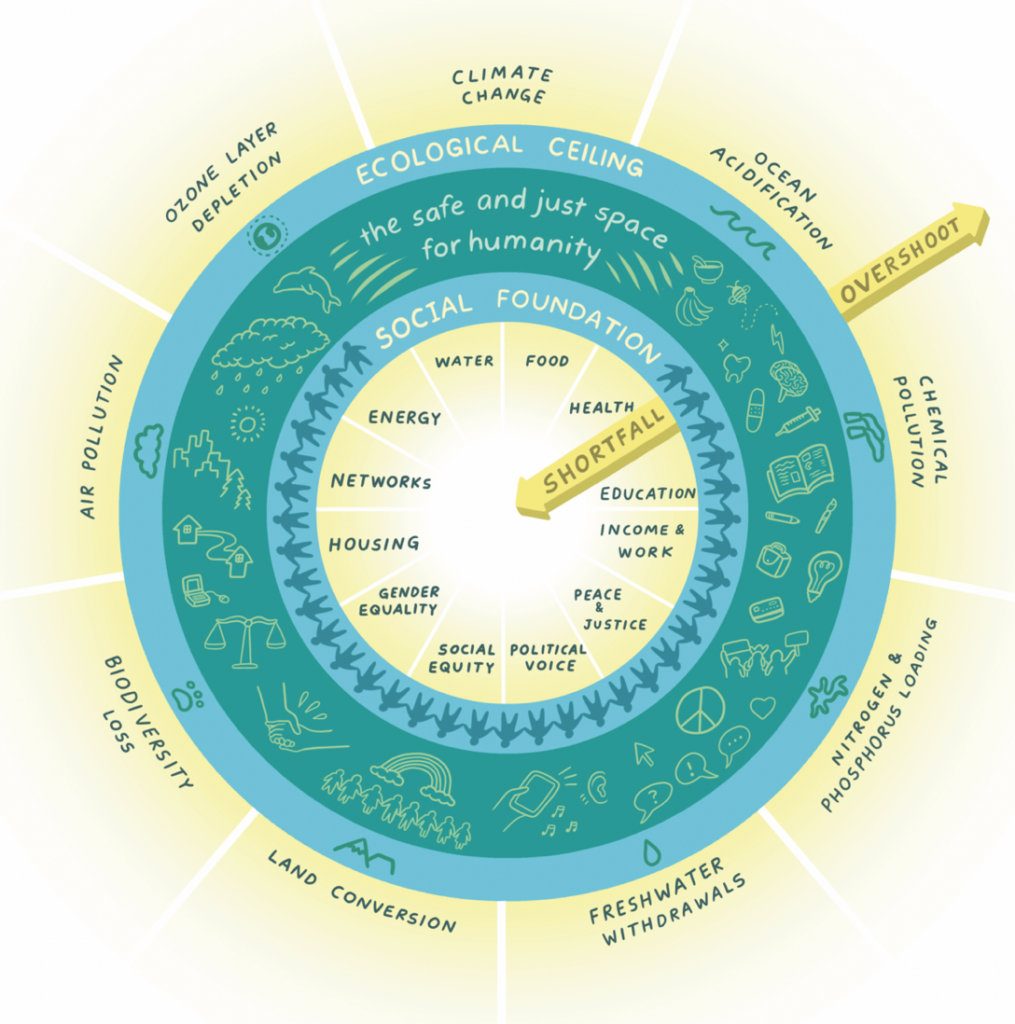
Der Donut: Wesentliche Aspekte und aufwerfende Fragen des Ansatzes für die Wirtschaftsförderung
“Nachhaltige Zukunftsstädte und Gemeinden“ (III)
„Städte haben in diesem Jahrhundert die Chance, die Zukunft der Menschheit zu gestalten und im Gleichgewicht mit dem Rest des lebenden Planeten zu gedeihen.“ (Doughnut Economics Action Lab, übersetzt aus dem englischen mit Deepl.com)
Der Gedanke hinter dem obigen Zitat fordert unser Verständnis von lokaler Wirtschaftsentwicklung in vielerlei Hinsicht heraus. Wie definieren wir eine gesunde, florierende lokale und nationale Wirtschaft, die lokale Chancengleichheit eröffnet, respektvoll umgeht mit den lokalen aber auch mit den internationalen menschlichen und ökologischen Ressourcen? Welches Verständnis von lokaler wirtschaftlicher Entwicklung und welches Handeln ist notwendig, um die Lebensbedingungen innerhalb unserer planetarischen Grenzen für die Mehrheit der Bürger zu verbessern? Wie lassen sich die vorhandenen Material- und Wissensressourcen für einen menschenwürdigen Entwicklungspfad am besten nutzen und freisetzen?
Grafik 1: Das Donut-Modell
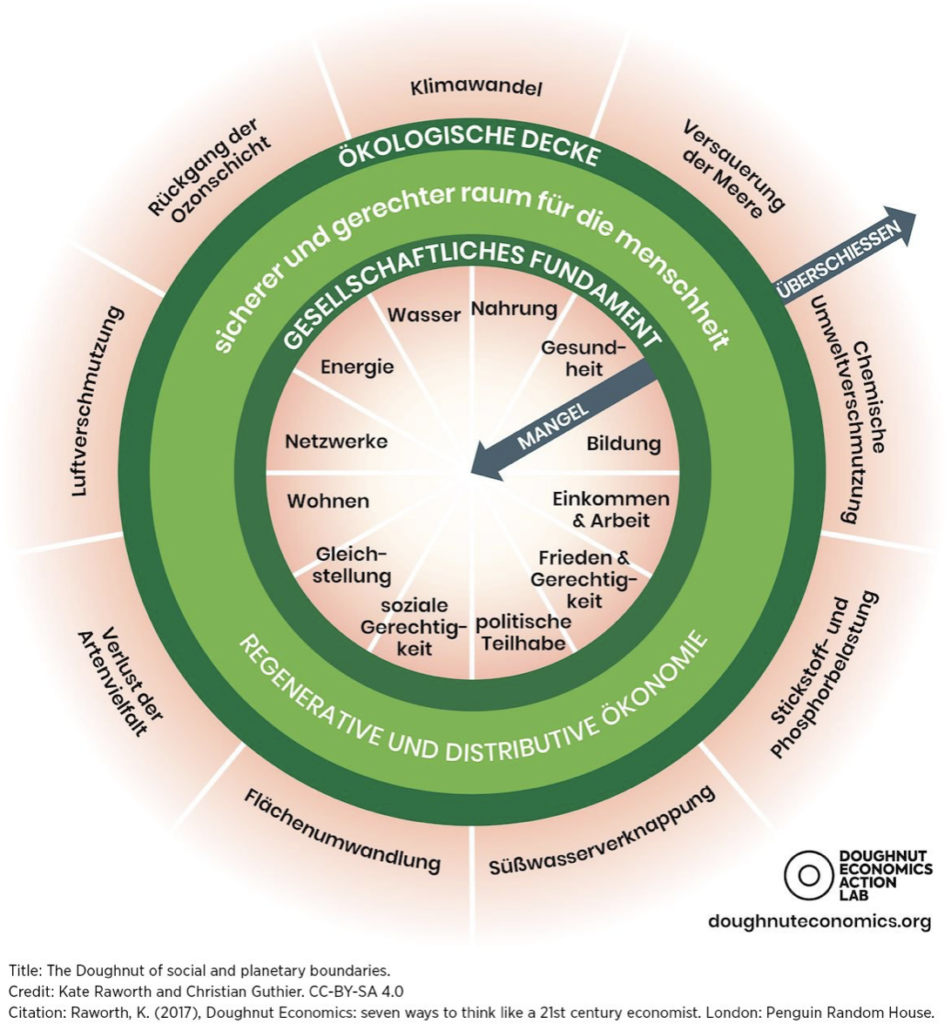
Economic Development 4.0: Experimental fields and own reflections for our work practice (Blog 2)
Sustainable Future Cities, Towns and Communities (II)
We started the first blog on the Economic Development 4.0 approach (hereafter referred to as ED 4.0) with Paul Watzlawick’s story about the man looking for his key. We highlighted the difference of this approach from traditional fields and called for a broader perspective and a new search process in the field of local and regional economic development. In this blog, we delve deeper into the areas of experimentation that the ED 4.0 approach emphasizes as well as how other economic development organizations and we at Mesopartner can broaden our perspective and rethink our practice.
Figure 1: The requirements to open up our perspective

In Germany the ED 4.0 approach is already being implemented in various cities and municipalities of different sizes (including Osnabrück, Wuppertal, Witzenhausen). Experiences from different EU countries were evaluated to define the experimental fields of the approach.
„Economic Development 4.0: Experimental fields and own reflections for our work practice (Blog 2)“ weiterlesen